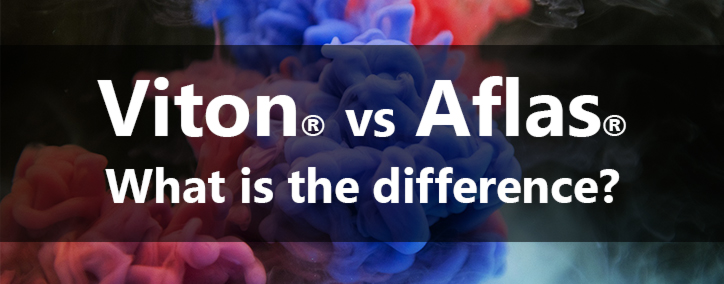 This article will outline the main differences between Aflas® vs Viton® O-rings. Customers typically request FKM or FFKM for harsher working conditions. However, choosing a lesser known compound can save a lot of money in the long term. Aflas® is a member of the fluoroelastomer family based on an alternating copolymer of TFE and propylene (FEPM). Introduced by the Asahi Glass Ltd under the name AFLAS®, just 5 years after the invention of FKM, in 1975. The unique polymer structure of Aflas® offers properties with a continuous working temperature of 200°C and a maximum peak exposure temperature of 205°C, with outstanding chemical resistance.
This article will outline the main differences between Aflas® vs Viton® O-rings. Customers typically request FKM or FFKM for harsher working conditions. However, choosing a lesser known compound can save a lot of money in the long term. Aflas® is a member of the fluoroelastomer family based on an alternating copolymer of TFE and propylene (FEPM). Introduced by the Asahi Glass Ltd under the name AFLAS®, just 5 years after the invention of FKM, in 1975. The unique polymer structure of Aflas® offers properties with a continuous working temperature of 200°C and a maximum peak exposure temperature of 205°C, with outstanding chemical resistance.
If you are looking for an O-ring suitable for contact with automotive fluids consider the following differences between FKM and TFEP. Here are the standard datasheets used to compare: Aflas® 80 ShA and Viton® 75 ShA.
Temperature Resistance
Aflas® Temperature Resistance: -5°C to +205°C
Viton® Temperature Resistance: -15°C to 200°C
On the whole there are pros and cons with both materials at temperature extremes. Aflas® can withstand higher temperatures and Viton® performs better at low temperatures. A point often overlooked is the test data doesn’t always reflect the compound performance. In reality, Aflas® exhibits a poor compression set at high temperatures, making it better suited for static applications. Compression set is as percentage of how much much memory is lost after the elastomer is compressed, a higher compression set indicates the O-ring will not fully recover its form.
Physical Properties
Otherwise, the two compounds offer very similar data sets. Between our two standard examples, Aflas® showed a slight improvement for results in tensile strength, elongation, modulus and specific gravity.
Chemical Resistance
This is where the two compounds really differentiate, because Aflas® is impervious to a wider range of chemicals. Viton® is generally recommended for contact with oils, greases and hydrocarbons. Such as the following:
- Mineral oil and grease, ASTM oil No. 1, and IRM 902 and IRM 903 oils
- Non-flammable hydraulic fluids (HFD)
- Silicone oil and grease
- Mineral and vegetable oil and grease
- Aliphatic hydrocarbons (butane, propane, natural gas)
- Aromatic hydrocarbons (benzene, toluene)
- Chlorinated hydrocarbons (trichloroethylene and carbon tetrachloride)
- Gasoline (including high alcohol content)
However, Viton® is not suitable for:
- Glycol based brake fluids
- Ammonia gas, amines, alkalis
- Superheated steam
- Low molecular weight organic acids (formic and acetic acids).
This is where Aflas® proves to be a great replacement for Viton®. It’s well suited to a wide spectrum of automotive fluids and additives such as motor oils, engine coolants, rust inhibitors, EP gear lubricant, transmission or power steering fluid and brake fluids. Also, it’s compatible with superheated steam applications.
Aflas® vs Viton® - What is the difference?
In summary, despite its raised compression set at high temperatures Alfas® makes a great choice for applications that make contact with chemicals that are not compatible with Viton®. For this reason, Aflas® is commonly used within thermal power plants, the oil and gas industry, chemical and nuclear plants and automotive industries.
Found the material for you? We stock over 50,000 O-ring sizes, click here to buy today!
We write articles about rubber chemistry to make life easier for engineering professionals. Sign up to our mailing list for bi-monthly content straight from the rubber press.
